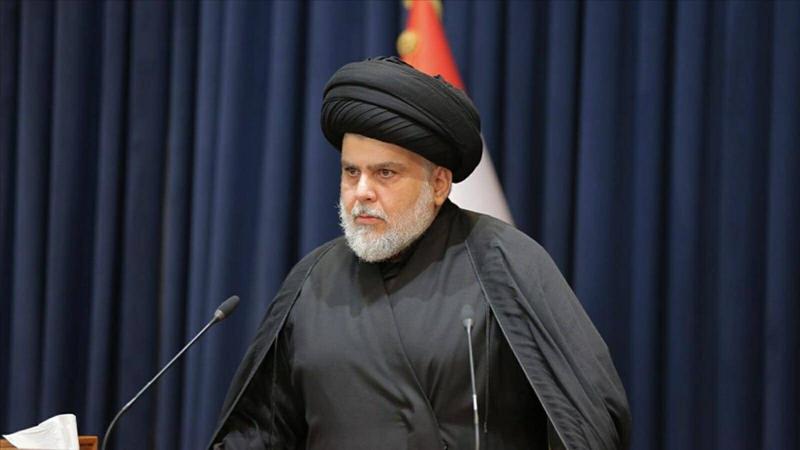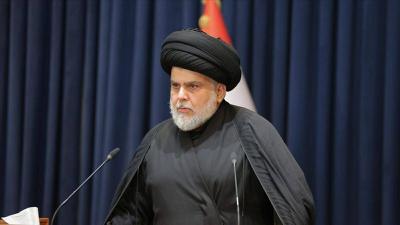The leader of the Sadrist movement is gradually paving the way for a potential return, especially after his mysterious visit to the home of the supreme Shiite authority, Ali al-Sistani, last week, and his notable appearance in a video where he spoke via "military communication device" to the leaders of his armed faction known as "Saraya al-Salam." However, sources suggest that this return might lead to a "complex Shiite map."
Two days ago, platforms close to the Sadrist movement published a video of Sadr walking in front of a large monitoring screen, addressing officials in "Saraya al-Salam" in Samarra, via wireless communication, thanking them for "serving the Iraqis." Much ink has been spilled in local media regarding the significance of Sadr's actions, but speculation focuses on preliminary steps for his return to the political scene.
Regarding the visit to al-Sistani's home two weeks ago, Sadrist media attempted to present it as significant, distancing it from the routine religious visits during the holy month of Ramadan. However, al-Sistani's office has not issued any clarification regarding what transpired during that visit. Since the religious authority closed its doors to political forces in 2016 and remained silent on political matters since 2019, statements from al-Sistani's office regarding his guests have been limited to his hospitality area known as "al-Barani" inside his home in Najaf.
During a previous visit by Sadr to the same home last year, al-Sistani's office clarified that the Sadrist leader attended "al-Barani," a public hospitality space, indicating that the discussions during this recent visit were different, as a close associate of Sadr described it as a "private meeting." This sparked political interpretations about the visit's significance and the nature of the discussions, especially given al-Sistani's preference to refrain from intervening in political affairs, contrasted with Sadr’s withdrawal from the political process despite his winning the highest number of seats in the 2021 elections.
Following the visit, Sadr began preparing for what appeared to be a series of practical steps rather than mere political gestures to test the waters after months of attempts by members of the "Coordination Framework" to bring him back into the fold, primarily led by the "State of Law" coalition headed by former Prime Minister Nouri al-Maliki.
While Sadr has begun taking tangible steps to demonstrate his strength and ability to mobilize his followers, sources indicate that "if he returns to political life, it will be according to his will and at the timing he chooses." Sources reveal that Sadr successfully launched a public initiative to aid Palestinians in Gaza at the beginning of last month, again showcasing his ability to mobilize significant public support. Additionally, Sadr formed five committees, including one comprising Sadrist MPs who resigned from parliament in the summer of 2022. While the 73 MPs cannot return to parliament unless new elections are held, merely announcing the existence of this group within a committee formed by Sadr signifies new movements being prepared by him.
The picture is now taking on a more serious aspect, even though the Sadrist movement, along with all its institutions, is cautious about making public statements due to the strong centralization controlled by Sadr. However, the question circulating among Iraqi politicians is whether Sadr's preparations are related to the possibility of early elections this year, and if his return is conditional upon that.
In the context of political debates, the Iraqi political forces opposing Al-Sudani, which include civil forces and independents, are suffering from fragmentation and are critical of the government's commitment in its program to hold early elections within a year. However, the forces that formed the government, whether Shiite (Coordination Framework) or Kurdish and Sunni (State Administration Coalition), are not in favor of early elections. Nevertheless, this option is now being pushed by forces looking to oust the government of Muhammad Shiya al-Sudani to prevent him from exploiting the government and gaining a larger popular base, which suggests that "complex calculations" are on the horizon before arriving at a new Shiite map.
In parallel with this debate, many political circles are promoting the possibility that Al-Sudani could form a cross-sectarian political bloc comprising Sunni and Kurdish forces, along with some members of the "Coordination Framework" who support his bid for a second term. This bloc seems set to compete with the "State of Law" coalition led by Nouri al-Maliki, who is reportedly trying to halt Al-Sudani’s expansion and has encouraged him to open a line of communication with Sadr to mix the dynamics, as stated by an independent Iraqi politician.
If Al-Sudani were to form this cross-sectarian bloc, which could impact Maliki's influence, Maliki's attempts to align with Sadr would appear directed against "the Popular Mobilization Forces," led by Qais al-Khazali, who will find the rules of the game changing upon Sadr's return—having previously split from this faction in 2004.




